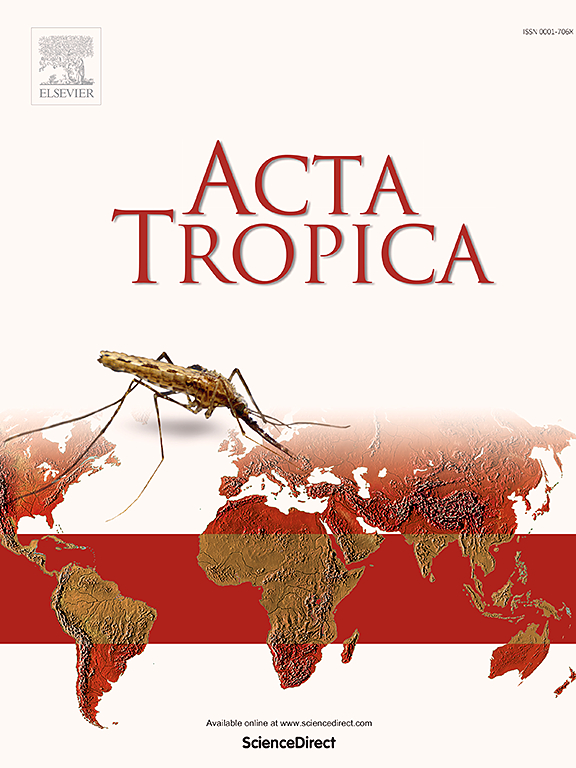对唐氏利什曼原虫抗坏血酸过氧化物酶及其衍生肽的免疫原性潜力进行硅学和体外评估。
IF 2.1
3区 医学
Q2 PARASITOLOGY
引用次数: 0
摘要
任何传染病的控制和根除都离不开潜在的疫苗,但人类内脏利什曼病(VL)尚未实现这一点。疫苗的缺乏可能会增加利什曼病在流行区定期爆发的风险。为利什曼病确定可靠的候选疫苗是一项重大挑战。在此,我们考虑对唐诺瓦利什曼病抗坏血酸过氧化物酶(LdAPx)进行体外评估,希望未来能找到治疗 VL 的候选疫苗。之所以选择 LdAPx,是因为它在利什曼原虫中的独特存在以及在 VL 发病机制中的毒性。最初,我们在 VL 患者的血清中发现了针对重组 LdAPx(rLdAPx)的抗体。因此,我们利用生物信息学预测并选择了十种(MHC I 类和 II 类)多肽。用来自健康、活动期 VL 和治疗期 VL 患者的 PBMC 对这些肽进行体外评估,结果表明,这些肽能诱导 PBMC 增殖、IFN-γ 分泌和一氧化氮(NO)产生,表明存在宿主保护性免疫反应。其中,三种肽(PEP6、PEP8 和 PEP9)可持续诱导 PBMC 产生 Th1 型免疫反应。与活动性 VL 患者和健康受试者相比,接受治疗的 VL 患者表现出更强的 Th1 型免疫反应,这凸显了这些肽作为候选疫苗的潜力。目前正在开展进一步研究,以评估 LdAPx 衍生肽或亚单位疫苗在动物模型中应对唐病毒挑战的效果。本文章由计算机程序翻译,如有差异,请以英文原文为准。
In silico and in vitro evaluation of the immunogenic potential of Leishmania donovani ascorbate peroxidase and its derived peptides
The control and eradication of any infectious disease is only possible with a potential vaccine, which has not been accomplished for human visceral leishmaniasis (VL). The lack of vaccines may increase the risk of VL outbreaks periodically in endemic zones. Identifying a reliable vaccine candidate for Leishmania is a major challenge. Here, we considered Leishmania donovani ascorbate peroxidase (LdAPx) for its in vitro evaluation with the hope of future vaccine candidates for VL. LdAPx was selected based on its unique presence in Leishmania and virulence in VL pathogenesis. Initially, we found antibodies against recombinant LdAPx (rLdAPx) in the serum of VL patients. Therefore, using bioinformatics, we predicted and selected ten (MHC class I and II) peptides. These peptides, evaluated in vitro with PBMCs from healthy, active VL, and treated VL individuals induced PBMC proliferation, IFN-γ secretion, and Nitric Oxide (NO) production, indicating host-protective immune responses. Among them, three peptides (PEP6, PEP8, and PEP9) consistently elicited a Th1-type immune response in PBMCs. Treated VL individuals showed a stronger Th1 response compared to active VL patients and healthy subjects, highlighting these peptides' potential as vaccine candidates. Further studies are on the way toward evaluating the LdAPx-derived peptides or sub-unit vaccine in animal models against the L. donovani challenge.
求助全文
通过发布文献求助,成功后即可免费获取论文全文。
去求助
来源期刊

Acta tropica
医学-寄生虫学
CiteScore
5.40
自引率
11.10%
发文量
383
审稿时长
37 days
期刊介绍:
Acta Tropica, is an international journal on infectious diseases that covers public health sciences and biomedical research with particular emphasis on topics relevant to human and animal health in the tropics and the subtropics.
 求助内容:
求助内容: 应助结果提醒方式:
应助结果提醒方式:


